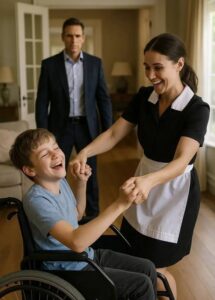Billionaire Walked in on the Maid Dancing with His Disabled Son—What Followed Changed Everything

Edward Grant’s penthouse often felt like a mausoleum—clean, silent, and emotionally barren. His 9-year-old son, Noah, had been paralyzed and speechless for over three years. After the tragic death of his mother, doctors had lost all hope. But everything shifted one quiet morning when Edward came home early… and saw something that stopped him cold.
Noah was… reacting.
Each morning unfolded with robotic precision. Edward would head to the office by 7 a.m., barely glancing at the breakfast tray left untouched by his son. There was never a reason to rush. Noah hadn’t spoken or moved since the accident.
After losing his wife and seeing Noah suffer spinal cord damage in the same incident, Edward threw millions into treatments—top neurologists, specialists, experimental therapy. Nothing worked. The boy just sat there, unmoving, staring at the sunlight spilling through the same window.
His eyes were not angry or grieving. They were simply… vacant. That haunted Edward more than anything.
One morning, a board meeting was unexpectedly canceled. Out of habit—not longing—he returned home early.
As he stepped off the private elevator, he froze.
Music.
Not from a speaker. Not classical or ambient. A soft, offbeat melody—alive and unfamiliar.
He followed the sound, heart beginning to race. And then, he saw it.
There, barefoot on the marble floor, was Rosa—the maid. She was dancing gently in the sunlight, twirling with surprising grace. But what made Edward’s breath catch wasn’t her dancing.
It was Noah.
Sitting in his usual chair, Noah’s fingers were interlaced with Rosa’s as she guided his hand in a slow, sweeping arc.
He was watching her. Fully focused. His eyes weren’t empty. They were present.
Edward didn’t interrupt. The moment was too fragile.
Rosa looked up briefly. She didn’t seem scared to be caught. If anything, she had expected him. She slowly stepped back, releasing Noah’s hand. It fell gently to his lap. Noah looked down—not with blankness, but with the quiet weight of a child who’s simply tired.
Edward said nothing.
Later, in his office, he called Rosa in.
“What exactly were you doing?” he asked.
She didn’t flinch. “I was dancing.”
“With my son?”
“Yes.”
“Why?”
“I saw something. A spark. I followed it.”
“You’re not his therapist.”
“No. But none of the professionals touch him with joy. I didn’t force him. I simply invited him.”
Edward felt his guard crack. “You could’ve jeopardized years of effort.”
“Nothing’s worked in years,” Rosa said gently. “Today, he chose to respond. Because he felt, not because he was told.”
Those words echoed in Edward’s mind long after she left the room.
That night, alone in the study, Edward reached for a drink—but instead opened an old photo album. There was a picture of his wife, Lillian, spinning barefoot in their living room with a laughing toddler Noah.
Scrawled on the back: Teach him to dance—even if I can’t.
Edward wept for the first time in years.
The next morning, Rosa didn’t say a word to Noah. She simply hummed as she swept. But Noah watched.
Days passed. Small changes surfaced—tiny eye movements, subtle smiles. Then, one afternoon, Edward heard it: a broken but real hum escaping from Noah’s lips.
Eventually, the boy’s arms began to move when Rosa danced. Then his upper body. One day, Edward joined in. Rosa handed him one end of a yellow ribbon, Noah held the other.
They moved together—father, son, and someone who no longer felt like “just the help.”
It wasn’t therapy anymore.
It was healing.

Weeks later, Rosa discovered an old letter in a forgotten drawer—addressed “To my other daughter.” The signature stunned her: Harold James Grant.
Edward’s father.
She waited before telling Edward. When she did, he was silent for a long time. Then, finally, he whispered, “You’re my sister.”
Rosa nodded. “Half. But yes.”
She left for a short time, unsure how to process it all. Without her, Noah regressed. When she returned, she placed one hand on Edward’s shoulder and the other on Noah’s.
“Let’s begin again,” she said.
And they did.
Together, they launched The Stillness Center, a space for children like Noah. On opening day, Noah stunned everyone by taking three steps and offering a shy bow.
He lifted the same yellow ribbon and twirled it in the air—his own kind of victory dance.
The crowd erupted in applause. Edward broke down. Rosa held him, tears streaming.
“He’s hers too,” Edward whispered.
Rosa smiled through her tears. Maybe she had always known.
That day, they didn’t move like patient and caretaker… or billionaire and maid… or even long-lost siblings.
They moved like family.
And Noah? He danced.